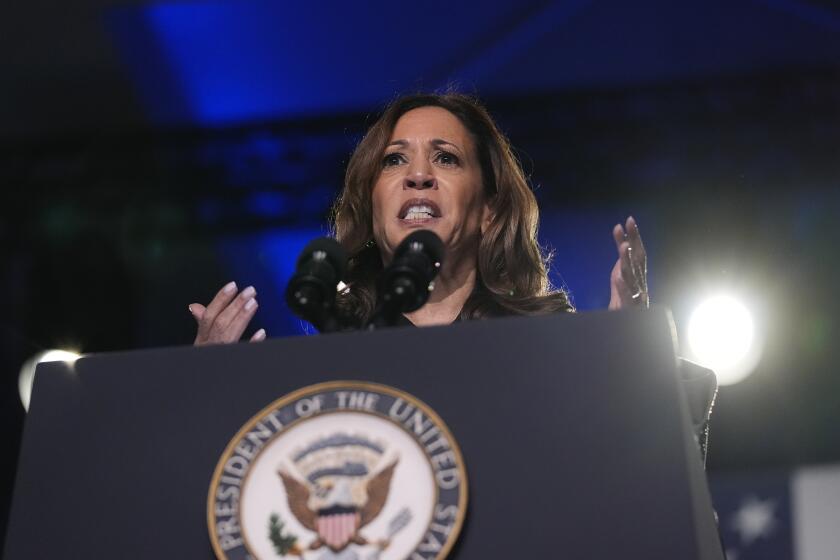S. Africa Invokes Emergency Laws : Gives Police Broad Power to Combat Unrest
President Pieter W. Botha declared a state of emergency Saturday in South Africa’s most troubled areas, giving the government sweeping powers in a bid to restore peace after nearly a year of civil unrest.
Suspending basic civil liberties in wide areas of the country and granting powers approaching those of martial law to the security forces, Botha said that growing violence now threatens the country’s basic stability and has to be brought to an end. That violence has left more than 475 people dead, all but three of them blacks, since last September.
While assuring “law-abiding” citizens that they have nothing to fear, Botha warned in a nationally televised address that “strict action will be taken against those persons and institutions that cause or propagate disruption.”
Wide Arrests Expected
Widespread arrests of activists opposing South Africa’s apartheid system of racial separation are expected. In 1960, the last time the government invoked its emergency powers so widely, hundreds of persons were rounded up within a few days, and most were not released until the state of emergency was ended five months later.
Under Botha’s proclamation, the police and army are authorized to make arrests without warrants and to detain persons indefinitely without access to the courts or their lawyers or families, to make searches and seizures without warrants, to close businesses, to prevent travel in and out of designated trouble areas, to impose curfews and to censor the press.
The proclamation, drafted under terms of a 1953 Public Security Act, also authorizes the national police commissioner to undertake “any other action deemed necessary” to maintain law and order.
The new measures, which take effect today for an indefinite period, apply in 36 magisterial districts in and around Johannesburg, in the Vaal River region about 50 miles south of here and in the eastern part of Cape province, including the Port Elizabeth-Uitenhage industrial complex. South Africa has about 300 magisterial districts, and Botha indicated that he will not hesitate to extend the state of emergency to other areas if unrest grows.
Gen. Johan Coetzee, the national police commissioner, told reporters that the new regulations will be applied differently from area to area, depending on local conditions. He said that police will continue to take the lead in law enforcement but will get increased backing from the army, including reservists who are called up.
Violators of the emergency regulations can be imprisoned for 10 years and fined the equivalent of $10,000 under the Public Security Act.
Botha’s surprise action drew immediate protests from all but the most conservative sectors of the opposition. And the South African Bar Assn. decried the widespread suspension of civil liberties and the expansion of the government’s authority to detain people without trial.
What triggered the government’s action after nearly a year of widespread unrest was a matter of conjecture, but three factors appeared Saturday to have been decisive: The recent discovery in black townships east of Johannesburg of a readiness among ordinary youths to be recruited by the outlawed African National Congress as urban terrorists and an underground network able to do the recruiting; the explosion of violence in Johannesburg’s black sister city of Soweto last week after months of relative calm there; and increasingly frequent attacks upon whites.
Botha justified the measures as the only effective response the government had left to cope with the unrest.
“Every responsible South African has, with growing concern, taken note of conditions of violence and lawlessness which, in recent times, have increased and become more cruel and more severe in certain parts of the country, especially in the black townships,” he said.
“These acts of violence and thuggery are mainly directed at the property and persons of law-abiding black people and take the form of incitement, intimidation, arson, inhuman forms of assault and even murder. This state of affairs can no longer be tolerated.”
To underscore Botha’s point, state-controlled television on Saturday showed a black woman, believed to be a police informer, being beaten, doused with gasoline and then burned to death as other blacks chanted anti-government slogans around her after a funeral for youths killed in earlier unrest at Duduza, east of Johannesburg.
A second film clip, taken at the funeral for four black activists mysteriously slain last month in eastern Cape province, showed prominent opposition leaders speaking in front of the flag and banner of the outlawed South African Communist Party, thus implying that they were, in effect, the party’s agents and that it was the cause of the unrest.
Criticism of the government’s move was expressed by Frederik van Zyl Slabbert, leader of the liberal white opposition Progressive Federal Party in Parliament, who said that resort to such measures shows that the ruling National Party’s policies are “a devastating failure.”
The Rev. Allan Boesak, patron of the United Democratic Front, a coalition of anti-apartheid groups, and president of the World Alliance of Reformed Churches, described the action as “a desperate gesture that won’t solve the problem,” but rather result in “more danger, more violence, more alienation.
“The government believes if they come down hard, that will end the unrest and turn our people around,” Boesak said in an interview. “They don’t realize that we will not be turned around by such methods anymore.”
The Rev. C.F. Beyers Naude, general secretary of the South African Council of Churches, said at a funeral for the four slain black activists in Cradock, 120 miles north of Port Elizabeth, that the emergency measures “cannot resolve the problem of violence in this country” because they do not go to the causes of the violence.
“You cannot bring peace unless first the doors of the prisons are opened for political prisoners, unless the exiles are allowed to come back, unless people, all the people, blacks and whites, are allowed to say what kind of country they will have,” Naude said.
Business leaders joined the protests, expressing their belief that tougher security measures might restore order for a time but will not resolve South Africa’s problems.
“To be effective, the restoration of law and order must be backed by a package of substantial reforms to recognize black aspirations and to redress legitimate grievances,” the Assn. of Chambers of Commerce and the Federated Chamber of Industry said in a joint statement. “Real negotiations in the political and industrial relations spheres are the key to an orderly South Africa and to stability in our (black) townships.”
Botha justified his action in terms of salvaging what remains of his reform program. “It is essential that the situation be normalized in such a way that the climate for continued dialogue in the interest of all people in constitutional, economic and social fields is ensured,” he said.
However, Slabbert, the Progressive Federal Party leader, commented: “What was supposed to be the beginning of an era of negotiation and consensus politics has seen us drift steadily into the present state of semi-siege. . . . This government has neither the ability, the plans nor the talent to cope with the demands of genuine reform.”
More to Read
Sign up for Essential California
The most important California stories and recommendations in your inbox every morning.
You may occasionally receive promotional content from the Los Angeles Times.










